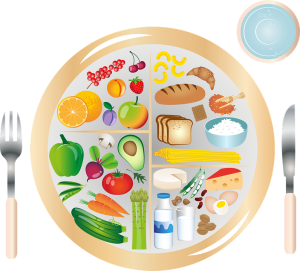You’ve heard of the COVID-19, but have you heard of its alleged partner-in-crime, the Quarantine-15? Cousin to the Freshman 15, the Quarantine-15 is said to live in your pantry and fridge among your favorite snacks. Most people who catch it don’t even know they have it until they switch from sweatpants to their pre-quarantine jeans.
To be clear, we are talking about weight gained during lockdown — not another bizarre addition to your 2020 bingo card.
https://twitter.com/_youhadonejob1/status/1281324368107372544
So, how can you avoid it? Luckily for you, Spinnaker tapped assistant professor of nutrition and dietetics Dr. Lauri Wright of the Brooks College of Health for the swoop on Quarantine-15 and some quick tips on how to combat lockdown weight gain.
The first big issue: Is the Quarantine-15 even real?
In the past, Spinnaker has reported on the myth of the Freshman 15 — the idea that one gains 15 pounds in their first semester at university as a result of being away from home and having easy access to a myriad of food choices on and off campus. Similarly to then, the ’15’ part is up for debate.
“The term is ‘the Quarantine-15,’ which is kind of interesting because we have no data to show it’s real,” Dr. Wright said. “We don’t have any hard data, but anecdotally I have certainly heard of people struggling with gaining some weight.”
Stress, lack of movement throughout one’s day, poor sleeping patterns, and a tendency to eat when one is bored can all be factors when it comes to seeing the scale go up. It doesn’t help that gyms were closed for a large portion of quarantine and only just reopened in the past few weeks.
“Between the stress that everybody was feeling and being in the house and boredom — I think it all kind of snowballed into some unhealthy habits,” Dr. Wright said.
Here are Dr. Wright’s tips for getting back on track.
Tip #1: Practice the Plate Method

“MyPlate helps guide you into a healthy, well-balanced meal,” she said.
MyPlate is a portioning method to help ensure one isn’t overeating one category while also putting together combinations that will keep you full. It consists of having one-fourth of your plate as lean meats and proteins such as chicken breasts, baked pork chops, grilled fish, etc.; one-half of the plate as fruits and/or vegetables; and finally the last one-fourth as whole grains, carbohydrates, pasta,and starchy vegetables such as potatoes.
“That helps ensure some of those combinations that help us feel full longer. When you combine the protein and the carbohydrate together, it helps keep you fuller a lot longer, so it helps avoid those spikes in blood sugar that set you up for snaking and overdoing it.
Additionally, consuming whole grains in combination with half a plate of vegetables provides you a boost in fiber.
“Fiber is nature’s appetite suppressant,” Dr. Wright explained. “It helps keep you fuller much longer.”
Tip #2: Get creative with healthy foods
Being stuck at home with the kitchen tantalizingly nearby has left us with an abundance of time to experiment with new ways of eating.
“Healthy foods don’t have to be blah,” Dr. Wright said.
She suggests giving avocado toast a try if you haven’t before, or throw together a parfait with Greek yogurt and fruit as a snack.
Tip #3: Avoid the mindless eating and drinking
Practicing mindfulness when it comes to what we put into our bodies can also help combat weight gain.
“Ask yourself, ‘Am I really hungry? Or am I bored? Tired? Stressed?’ Do that check,” Dr. Wright suggests. “Is this really about hunger or is this something else that’s putting you into the kitchen?”
Practice mindfulness when grocery shopping as well and make an effort to purchase healthy snacks while avoiding bringing the unhealthy stuff into your home in the first place. And when you’re consuming it, try not to do so in front of the television.
“Studies show that you consume more calories, because, again, it becomes mindless. You’re not thinking about, ‘Am I full?’ You’re just kind of paying attention to the TV and still eating.”
Finally, relating to mindfulness: try not to eat straight out of the bag of chips or carton of ice cream.
“It’s really hard to portion it out when you have a whole bag. Try to get those individual snack bags or those small containers of ice cream. You’re going to save a lot of calories to have it portioned out for you.”
Calories in liquids count against your daily intake, too, and for that reason it might not be advisable to jump on the wagon of increasing alcohol sales at this time.
“Stick to more of water and low-fat milk,” Dr. Wright said. “Watch out for all of the calories in alcohol and soda. If you’re stressed out, find other ways to deal with that stress.”
Tip #4: Move
You’re gym might still be closed. In that case, try to look for more creative ways to inject activity into your day. There are a myriad of fitness companies who have made their workouts free during the pandemic to help people stay healthy. Just a few on the list:
“Do some kind of class you’ve never done before. Maybe some kind of dance class. There’s a lot of different yoga classes now that are online and free. Download an app, go for a walk with your pet or family — that’s going to help a lot with stress. When you move, it helps reduce the stress we feel.”
Dr. Wright suggests setting a step goal for the day to motivate yourself. In combination with healthy eating habits, moving will help burn calories and keep stress down.
___
For more information or news tips, or if you see an error in this story or have any compliments or concerns, contact editor@unfspinnaker.com.











